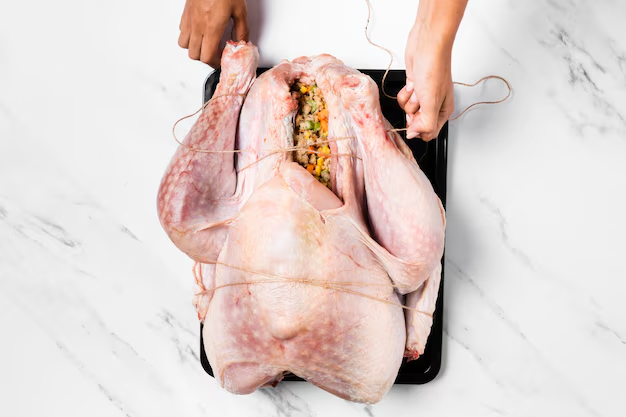Is It Safe to Store a Hot Turkey in the Refrigerator?
Thanksgiving is in the air, and few things mark the holiday as quintessentially as the aroma of a roasted turkey wafting through the house. But the feast doesn't end at the dinner table; there are leftovers to consider. This leads to a common culinary conundrum: Can you put a hot turkey in the refrigerator, or should you wait for it to cool? This guide provides a clear, engaging exploration of this topic, offering solutions and insights for your holiday feast.
🦃 Understanding the Basics of Turkey Storage
Why Temperature Matters
The temperature of the turkey, when storing it, plays an essential role in food safety. Hot foods need to be handled carefully to prevent the growth of harmful bacteria. Foodborne illnesses can arise from incorrect handling and storage of cooked food. The USDA warns against leaving cooked food out at room temperature for more than two hours. This timeframe is critical to avoid bacteria multiplication, which can occur rapidly between 40°F and 140°F—a range aptly termed the "danger zone."
The Science Behind Cooling
When food like a hot turkey is left out to cool completely before refrigerating, it risks spending too long within this danger zone. While it might seem logical to wait until food cools to place it in the refrigerator, this can be counterproductive. Introducing a slightly warm (not piping hot) turkey into the refrigerator helps ensure that the internal one doesn't linger in the danger zone for long.
Debunking Myths
A common myth suggests immediately refrigerating hot foods can spoil your refrigerator or lead to uneven cooling. However, modern refrigerations are designed to handle such changes. The critical concern should be balancing safe cooling rates to keep your guests healthy while preserving the electric efficiency and cooling integrity of your refrigerator.
🌡️ Practical Steps for Safely Cooling and Storing Turkey
Immediate Actions Post-Cooking
Carve the Turkey: Before considering refrigeration, start by separating the meat from the bones. This not only helps in efficient storage but also accelerates the cooling process.
Use Shallow Containers: Store turkey pieces in shallow, airtight containers which help distribute the heat more evenly and aid quicker cooling.
Place Turkey in the Fridge: You don't have to wait for the turkey to cool completely if you take these measures. Slightly warm turkey can enter the refrigerator without causing damage or jeopardizing safety.
Leveraging Ice Baths
For those with a bit more kitchen resourcefulness, submerging heat-safe containers of turkey in an ice bath can help drop the temperature quickly. This method can be useful for large portions. One should ensure the turkey doesn't get submerged directly into water—this technique uses a sealed container surrounded by ice water to effectively cool.
🍽️ From Fridge to Table: Reheating Leftovers Safely
Safety extends beyond proper storage; reheating turkey also requires attentiveness:
Reheat to the Right Temperature: When planning for leftovers, reheating turkey to an internal temperature of 165°F ensures it is safe to eat.
Avoid Double Cooking: Reheat only what you intend to consume, avoiding repeated cooling and heating, which can contribute to food quality loss.
📋 Key Takeaways for Turkey Storage
Here's a succinct summary to make your holiday leftovers both safe and delicious:
- 🚫 Avoid the Danger Zone: Do not let turkey linger between 40°F to 140°F for too long.
- 🕒 Time is of the Essence: Do not leave a cooked turkey at room temperature for over 2 hours.
- 📦 Proper Packaging Matters: Use shallow, airtight containers for quicker cooling and efficient use of fridge space.
- 💧 Use an Ice Bath: When cooling a lot of food rapidly, an ice water bath is helpful.
- 🌡️ Mind the Reheat: Reheat leftovers to 165°F before serving.
🙋 FAQs: Easily Overcome Turkey Storage Concerns
Can You Streamline the Cooling Process?
Certainly! Try cutting the turkey into smaller pieces right after serving and place them in shallow containers. This permits quicker, more uniform cooling.
Does Hot Food Raise Refrigerator Energy Costs?
While hot foods can cause your fridge to work a bit harder temporarily, the perpetual efficiency of modern appliances mitigates sustained energy wastage when done within the right parameters.
What if Turkey Is Left Too Long?
If food is left at room temperature beyond the two-hour mark, it's safer to discard it. Always err on the side of caution when it comes to food safety.
🎉 Conclusion: Enjoy a Safe, Delicious, and Memorable Holiday
Cooking and storing turkey should be as joyful as the holiday it represents. By understanding the essentials of food safety and practical steps to cool and store your leftover turkey, you ensure everyone can savor the meal safely over the following days. Embrace these guidelines not just during Thanksgiving but whenever you're working with large portions of food, ensuring every meal prepared is warm in its welcome and worry-free from any risks.
Armed with this knowledge, both budding cooks and seasoned chefs can tackle the turkey dilemma with confidence, creating a memorable holiday dining experience that continues long after the plates are cleared.

